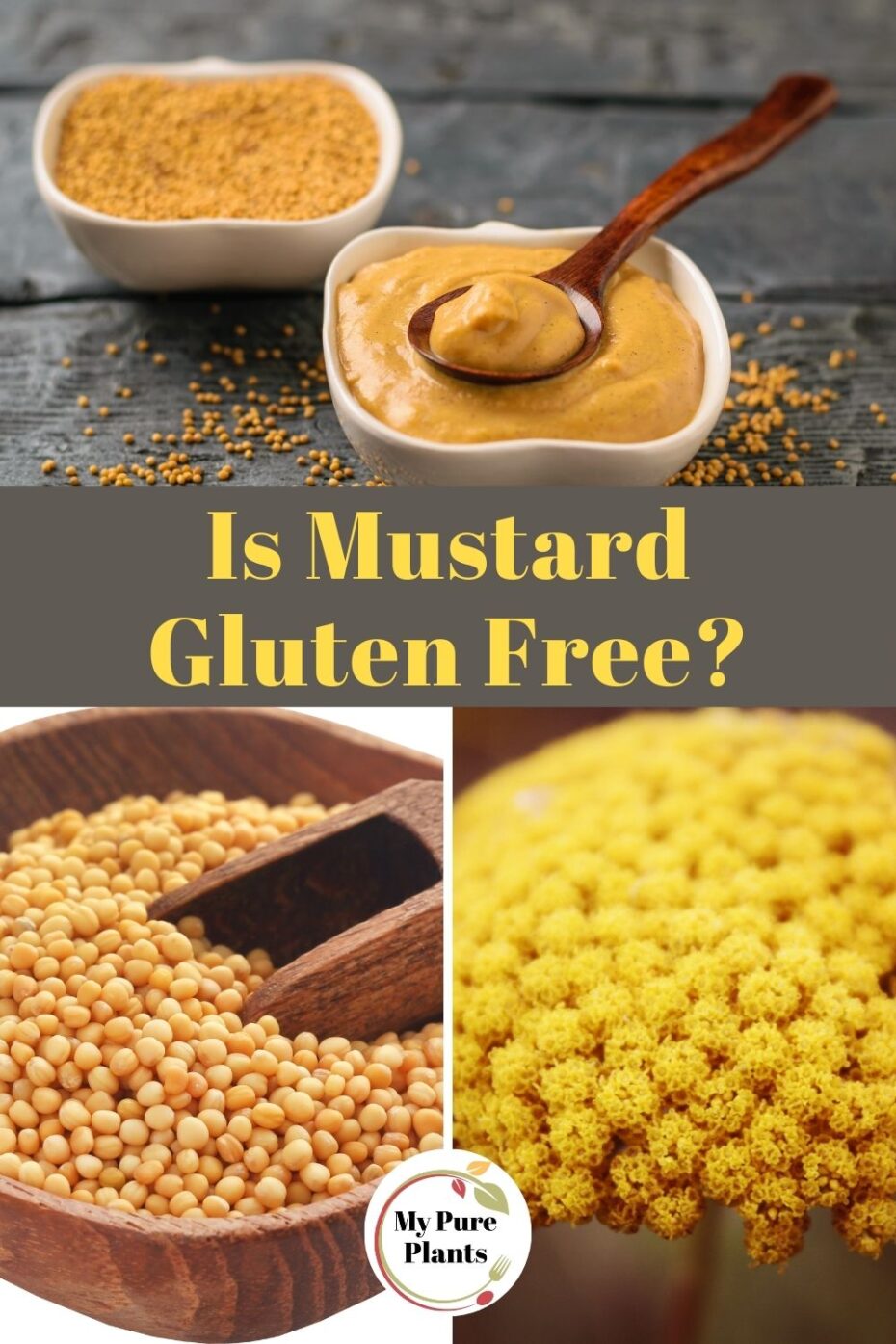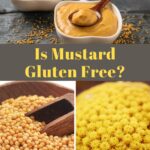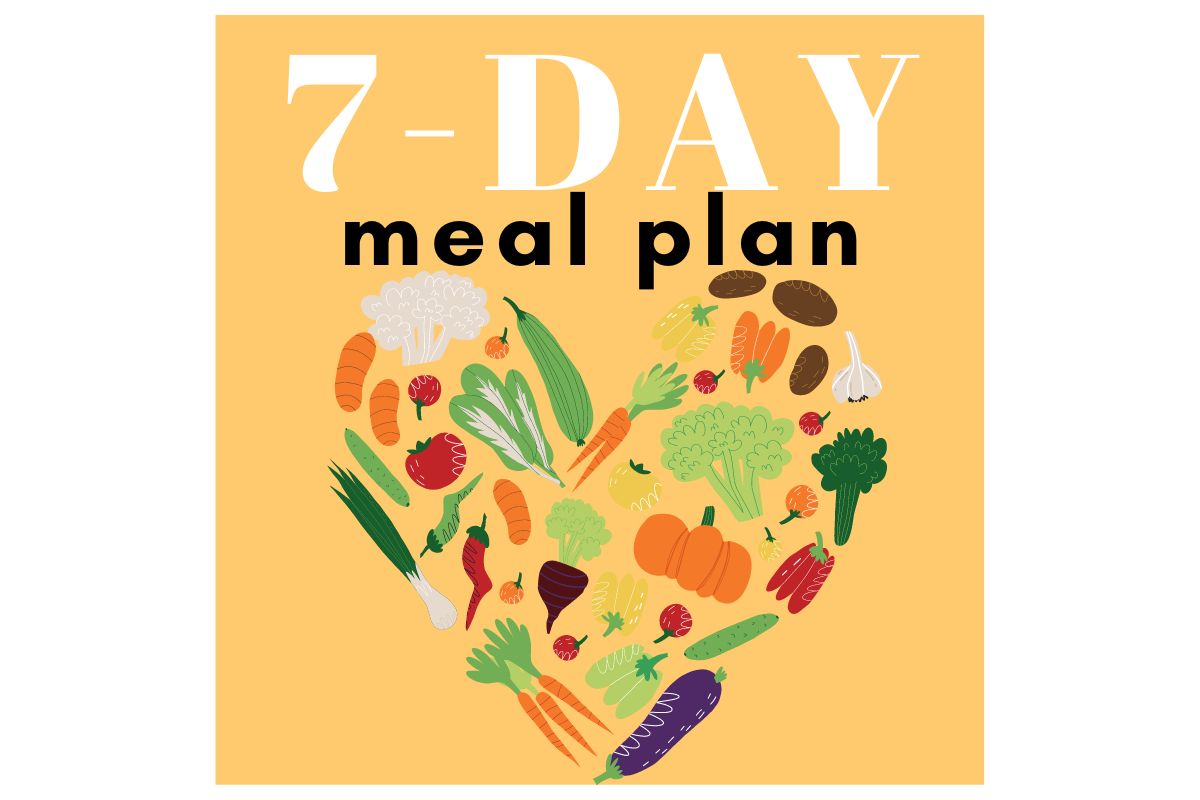What is mustard made of? Is it gluten-free? Sadly, not always. Most of the issues are with cross-contamination or with the use of malt vinegar. However, we did find 20 gluten-free mustard brands including Dijon mustard and flavored gourmet mustards that are safe in a gluten-free diet.

Want to save this post?
Enter your email below and get it sent straight to your inbox. Plus, I’ll send you budget recipes and money-saving tips every week!
What is Mustard?
Do you know what is celebrated on the first Saturday of August each year? National Mustard Day!
Mustard seeds are believed to be one of the first crops grown in India, China, and Egypt. The Greeks even prescribed it as medicine for anything – from snakebites to the plague!
The name is derived from Latin “mustum ardens”, which refers to the ancient method of mixing ground seeds with unfermented wine grape juice (must) to give that spicy taste of ‘burning must’.
While all parts of the mustard plant are edible, it is the seeds that are mainly used to make the condiment. The basic ingredients included are mustard seeds, water, salt, and vinegar or wine.
To make mustard, the seeds (black, brown, or white) are crushed and dehulled, then mixed with a cold liquid (vinegar, wine, water), and finally, flavorings and spices are added. The variations in ingredients is what gives us the different kinds of mustard.
Is Mustard Gluten-free?
Unfortunately, there is no easy answer to this. Let’s see all ingredients:
- Mustard seeds are naturally gluten-free, but there might be cross-contamination during manufacturing or in farms that grow many crops together.
- Distilled vinegars, red wine vinegar, balsamic vinegars, cane vinegar and apple cider vinegar are usually safe. But malt vinegars (wheat, rye, barley), flavored vinegars, and certain Asian rice vinegars are the ones to avoid. Read our “Is vinegar gluten-free?” article to see which ones are certified gluten-free products.
- HOWEVER(!), mustards made with brewed beverages like ale or beer, or white vinegars that have not been distilled are also not gluten-free.
So is your mustard gluten-free? For this, look at the labels for terms like “no gluten”, “free of gluten”, “without gluten”, and “gluten-free”. You can also check for the gluten-free certification mark by the Gluten-Free Certification Organisation (GFCO).
Differences between Dry mustard and Ground mustard
Dry mustard, English mustard, powdered mustard, ground mustard, mustard flour, ground mustard seed, and dry mustard powder, are all names for the same spice made from grounded mustard seeds. It can be used to season salads, sauces, soups, and other dishes.
Despite there being no actual difference between dry and ground mustard, some companies claim that mustard quality and fineness of grind differentiate them. So don’t worry yourself too much over this as most brands highlight the “differences” as a clever marketing tactic over any actual reason.
What is Dijon Mustard?
The French adored this ‘Condiment of Kings’ so much that Pope John XXII of Avignon even created the position of “Grand Moutardier du Pape” or “Grand Mustard-maker to the Pope.” Eventually, Dijon mustard, a type of prepared mustard, was created at the World’s Mustard Capital in Burgundy, France.
The French Government even passed strict regulations on “Dijon mustard” production. It had to be prepared from mustard seeds, and the wine aged for at least 12 days. Traditional Dijon was made by soaking black or brown mustard seeds in water, blending with vinegar, and grinding to a fine paste.
Moutardier Maurice Grey with Auguste Poupon invented the machine that automated mustard seed processing. Their company Grey Poupon’s mustard was made with white wine, spices, and herbs. The traditional recipe was improved by Jean Naigeon, who replaced vinegar with verjuice (juice of unripe grapes), to give it a less harsh flavor. Dijon mustard can be used as a vinaigrette, added to vegetables, cheeses, sauces, soups, or in “à la dijonnaise” French dishes.
Gluten-free Mustard Brands
There are many kinds of mustards made with several ingredients to create unique flavor profiles. Here’s a list of gluten-free mustards that you can buy to add to your burger, sandwich, or more.
Annie’s Naturals
Annie’s Organic Yellow Mustard* and Organic Dijon Mustard* are made from distilled white vinegar derived from corn or beets, while the Organic Honey Mustard* and Organic Horseradish Mustard* are made from apple cider vinegar. All of these are certified organic, high quality, and “naturally gluten-free.” Please note that honey is not vegan and since we are also a vegan blog, I would like to point this out as well.
Blanchard & Blanchard’s Imitation Mustard
This Yellow Imitation Mustard* is made without any gluten-containing ingredients, and can be used as a dip or marinade. It contains eggs, cottonseed oil, sugar, salt, turmeric, spices, and Passover vinegar, making it kosher. Since we are also a vegan blog, we note here that it is not suitable on a vegan diet since eggs are added to it.
Boar’s Head
From an old German recipe that mixes horseradish with white wine, the Delicatessen Style Mustard* offered by Boar’s head is gluten-free. Similarly, their Honey Mustard* is also safe for those on a gluten-free diet. Their 54% Lower Sodium Yellow Mustard* combines Himalayan pink salt and sea salt, to give you a gluten-free and milk-free mustard. Since we are also a vegan blog, we note here that honey is not vegan so the Honey Mustard is not a suitable option.
Bone Suckin’
If you are looking for gluten-free mustard that is both sweet and spicy, this mustard is for you. Bone Suckin Mustard* is made from organic yellow mustard, organic distilled vinegar, brown sugar, jalapeño peppers, and other spices, this is a fantastic dipping sauce too!
Bornier
This import from Dijon offers an authentic taste of old-school Dijon. Their Dijon Mustard* has been awarded a gold medal in the worldwide mustard competition. They have different kinds of mustard, and all of them are gluten-free.
French’s
Their kosher Classic Yellow Mustard* made from stone-ground high-quality mustard, distilled vinegar, turmeric, and other spices, was first introduced on a hotdog at the St. Louis World’s Fair in 1704. This iconic pairing went on to make history as the classic American food was eaten at ballgames, parties, and more!
French’s Honey Mustard, Spicy Brown Mustard, and Dijon Mustard (made with Chardonnay) are all labeled gluten-free. The McCormick company’s allergen statement says that they will always include the presence of allergens (gluten) in their ingredient list. So always check the packaging to be sure!
Heinz
Only made from high-quality, organic ingredients, the Organic Yellow Mustard* is bottled in an upside-down, easy-squeeze container. The “common condiment made uncommonly well” is prepared using mustard seeds, distilled vinegar, turmeric, and spices. The company also offers 100% natural Yellow Mustard, Spicy Brown Mustard, and Honey Mustard. While they don’t have any gluten-free labels, Heinz states that there are no allergens.
Herlocher
This mustard contains no gluten, fat, or salt. Herlocher’s Dipping Sauce* is more than just mustard, it is made by blending eggs, sugar, distilled vinegar, mustard flour, turmeric, and food starch. Recommended with fresh veggies, pretzels, and fried foods, it has a characteristic sweet and rough taste that is well-loved by its fans. Although it is not an option for gluten-free vegans due to the eggs.
Hlthpunk
This premium, vegan, soy-free, cruelty-free mustard comes in an interesting toothpaste-like tube. Entirely free of gluten, the smooth, creamy, and Hlthpunk Dijon Mustard* is a fun dip at parties. The company also donates 2% of its profits to the Biodynamic Demeter movement, a regenerative style of agriculture.
Koops’
Koops’ Mustard* comes in 14 bold flavors, and all their mustards are 100% gluten-free. They even offer organic versions of some flavors! If you are feeling adventurous, try their Düsseldorf Mustard, Jalapeño Mustard, or Arizona Heat Mustard.
Maille
The squeeze bottles of Maille’s Old Style Mustard* and Dijon Originale Mustard* are labeled gluten-free. They both are manufactured from distilled vinegar, are kosher, and free of artificial colors and flavors.
Miller
For anybody who loves exploring new tastes, Miller’s Banana Pepper Mustard* is the one for you! It comes in three levels of spiciness – Mild, Hot, and Habanero. Prepared from farm-fresh, vine-ripened banana peppers, mustard seeds, distilled vinegar, turmeric, paprika, and raw sugar, actor Alec Baldwin sums this mustard up perfectly, “Fantastic!”
Noble Made
Noble Made Mustard* by The New Primal Store has a bold flavor, crunchy texture, and can be used as a spread or a dip. The grainy, sugar-free Dijon is made without the use of white wine. It is gluten-free certified.
Organicville
This unique company offers vegan, organic, non-GMO, employee-owned mustards. Choose between Yellow*, Dijon*, and Stone Ground* mustards, because all of them use vinegar that is derived from only cane or corn, meaning all of them are gluten-free. They even have a salt-free variant of their Stone Ground Mustard for those watching their salt intake.
Plochman
Plochman Mustards* are gluten-free, low-calorie, kosher, and free of artificial flavors. They also offer a huge variety of flavors. Their yellow mustards include Original Mild, Chicago Fire, and Chili Dog, and are all packaged in cute barrel-shaped bottles.
Portland
This creamy reinvention of the classic yellow American condiment goes superbly well with homemade dressings, potatoes, or pretty much anything else. The Portland Mustard* is organic, vegan, and gluten-free. The bottles even come with a unique picture from Portland on their label!
Sir Kensington
“A winner among wieners”, Sir Kensington’s Mustards* are certified gluten-free, and are made with seeds stone ground in traditional mustard mills. There are 4 available varieties – Spicy Brown Mustard, Yellow Mustard, Dijon Mustard, and Honey Mustard that come in bottles made from 100% recycled plastic. Please be mindful that honey is not vegan, so if you need to choose a different alternative.
Tessemae
They offer 3 kinds of organic, vegan, gluten-free, sugar-free, and dairy-free mustards made from vinegar: Organic Yellow Mustard, Organic Dijon Mustard*, and Organic Honey Mustard. Use it in a potato salad, in sandwiches, or as a dip to spice up the flavor of your dish.
Terrapin Ridge
For those excited to experiment with exotic combinations of mustard, this brand offers some great vegan and gluten-free options: Dill Pickle Mustard*, Garlic Kraut Mustard, and Sweet Beet and Horseradish Mustard. They make an impressive cheese topper, and can even be served with pita chips!
Truffle Hunter
Gluten-free gourmet mustards from France anyone? Truffle Hunter’s Black Truffle Mustard* and Black Truffle Dijon Mustard are what you need. They are made by blending authentic Dijon mustard with premium quality European Black truffles. Light, slightly spicy, with a distinct black truffle taste, this everyday luxury can be spread on practically anything! They are also vegan, nut-free, and gluten-free.
Mustard Brands Not Labelled as Gluten-free
Grey Poupon Mustards
The commercial featured the signature “Pardon me, would you have any Grey Poupon*?”, making this product synonymous with the elite. Manufactured from mustard seeds, vinegar, spices, and white wine, Kraft Food’s Dijon Mustard comes in a classy glass jar. They also have varieties like the Country Dijon (using coarse ground seeds), Deli Mustard, Harvest Coarse Ground Mustard (using whole mustard seeds), and Mild and Creamy Dijon. While the ingredients themselves do not contain gluten, the company bears NO gluten-free labels, and this might indicate cross-contamination.
Gulden’s
With a recipe that has remained a secret for 140 years, Gulden’s Mustard* is the oldest nationally sold prepared mustard. Their Spicy Brown Mustard made from mustard seeds, organic vinegar, salt, and spices makes a yummy topping for burgers and sandwiches. Other flavors include Honey Mustard, Bold Yellow Mustard, Sriracha Mustard, and Stone Ground Dijon Mustard.
While Gulden’s mustards do not contain gluten in their ingredients, the company does use vinegar derived from corn or wheat. As they aren’t labeled gluten-free, they may be subject to cross-contamination. I also found in this forum that someone had a reaction and called the company which confirmed that indeed cross-contamination is possible.




Leave a comment